高中英语习惯用法汇总
- 格式:doc
- 大小:96.50 KB
- 文档页数:4
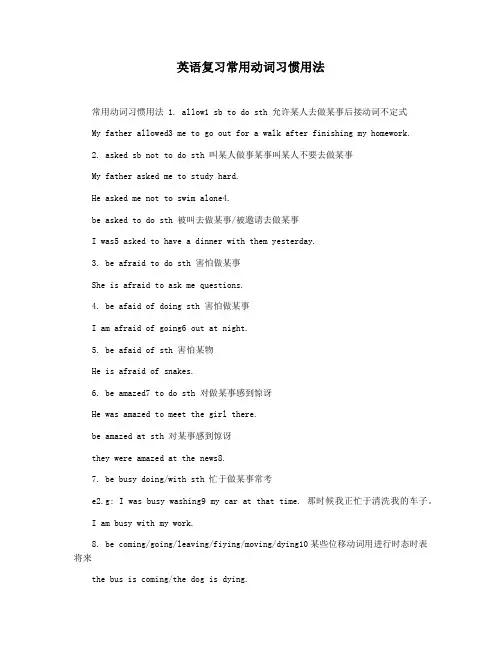
英语复习常用动词习惯用法常用动词习惯用法 1. allow1 sb to do sth 允许某人去做某事后接动词不定式My father allowed3 me to go out for a walk after finishing my homework.2. asked sb not to do sth 叫某人做事某事叫某人不要去做某事My father asked me to study hard.He asked me not to swim alone4.be asked to do sth 被叫去做某事/被邀请去做某事I was5 asked to have a dinner with them yesterday.3. be afraid to do sth 害怕做某事She is afraid to ask me questions.4. be afaid of doing sth 害怕做某事I am afraid of going6 out at night.5. be afaid of sth 害怕某物He is afraid of snakes.6. be amazed7 to do sth 对做某事感到惊讶He was amazed to meet the girl there.be amazed at sth 对某事感到惊讶they were amazed at the news8.7. be busy doing/with sth 忙于做某事常考e2.g: I was busy washing9 my car at that time. 那时候我正忙于清洗我的车子。
I am busy with my work.8. be coming/going/leaving/fiying/moving/dying10某些位移动词用进行时态时表将来the bus is coming/the dog is dying.9. be excited11 to do sth 对做……感到兴奋Jacky was excited to travel12 there by plane.be excited at sthLily13 was excited at his words.be excited about doing sthhe was excited about passing the exam14 without going overing books.10. be frightened15 to do sth 害怕去做某事Sam is frightened to ride a horse.11. be glad/happy to do sth 高兴去做某事she is happy to clean the blackboard with me.be pleased16 to do sth高兴做某事she was pleased to help the old man yesterday.be pleased with sth 对某事感到高兴/满意the teacher was pleased with my answer.12. be interested17 in sth/doing sth 对某事感兴趣/对做某事感兴趣she is interested in swimming in the river.My btother is interested in Chinese.13. be/get ready for/to do sthBe ready for sth 为某事做好了准备We are ready for the exam.Be ready to do sth 为做某事做好了准备We are ready to have a birthday party for her.get ready for sth为某事在做准备We are getting ready for the exam.get ready for sth 为做某事而做准备13. be sorry to do sth 对做某事感到抱歉14. be surprised18 to do sth 对做某事感到惊奇be surprised at sth 对某事感到惊奇15. be worth19 doing sth 值得做某事worth 后接动词-ing形式,常考16. begin to do sthbegin/start to do/doing sth 开始去做某事17. can/be able20 to afford21 to buy sth 有能力购买供……18. can/may/must do sth could/would22/should/might do sth19. can’t wait to do sth 迫不急待地去做某事20. decide23 to do sth 决定去做某事make up one’s mind24 to do sth 下决心去做某事常考make a decision25 to do sth 对做某事作出决定21. deserve26 to do sth 值得/应该做……22. encourage27 sb to do sth 鼓励某人去做某事23. enjoy doing sth 乐意去做某事24. expect28 sb to do sth 期望去做某事25. fail29 to do sth 做某事失败succeed30 doing sth 成功做了某事26. finish doing sth 做完某事后接动词-ing形式常考27. follow sb to do sth 跟随某人去做某事28. get sb to do sthmake sb do sthlet sb do sth 让某人做某事后接动词原形29. get/have a chance31 to do sth 得到一个做某事的机会30. give/pass/show/lend/sell sb sth/sth to sbbuy/get/bring sb sth/sth for sb31. go on to do sth 继续做事常考go on doing sth 继续做事常考32. hate32 to do/doing sth 讨厌/不喜欢做某事33. have fun doing sth34. have problems33 doing sth 做某事遇到困难35. have sb do sthhave sth donehave sth to do 工有事要做36. hear sb do sth 听到某人做某事后接动词原形,常考hear sb doing sth 听到某人正在做某事常见37. help to do sth 帮忙做某事help sb to do sth 帮助某人做某事38. hope/wish to do sth 希望做某事wish sb to do sth 希望某人做某事39. I t seems35 that 这像是……后接从句seem34 to do sthseem +adj40. It’s + adj+for sb to do sth .It’s+adj +of sb to do sthe.g: It’s glad for him to hear the news.41. It takes sb some time/money to do sth . 花费某人多长时间做某事常考42. pay36 …for… cost37 spend…on….. it take …to do sth43. It’s best for sb to do sth. 对某人来说做某事是最好的had38 better do sth 最好做某事注意had没有时态和人称的变化,better后接动词原形44. It’s time for sb to do sth 是某人做某事的时候了45. keep ondoing sth 坚持做某事常考keep sb doing sth 让某人做某事常考keep sb from doing sth 阻止某人做某事常考keep sb/sth +adjkeep the book for 2 days 借这本书两天不要用borrow或lend46. learn to do sth 学做某事learn sth from sb 向某人学习47. like to do/doing sth 喜欢做某事like sb to do sth 喜欢某人做某事48. need to do sthneed doing sth/to be doneneed sth needn’t do sth需要做某事49. prefer39 to do sth rather40 than do sth 宁愿……而不愿……常考prefer doing sth to doing sth 喜欢做……胜过做……e.g: I prefer reading41 books to going shopping. 比起购物来,我更爱读书。
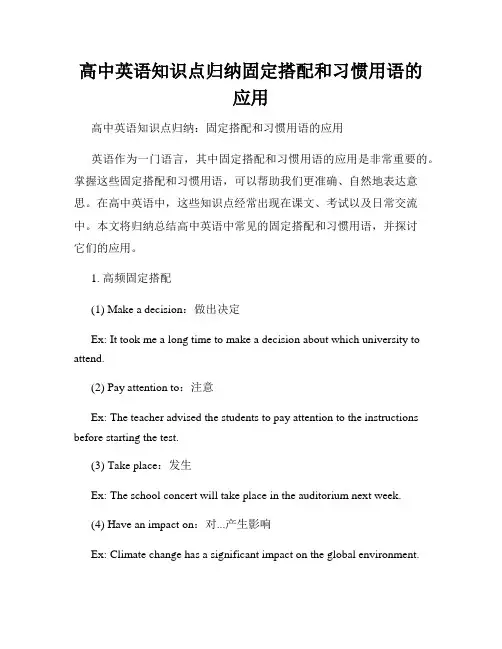
高中英语知识点归纳固定搭配和习惯用语的应用高中英语知识点归纳:固定搭配和习惯用语的应用英语作为一门语言,其中固定搭配和习惯用语的应用是非常重要的。
掌握这些固定搭配和习惯用语,可以帮助我们更准确、自然地表达意思。
在高中英语中,这些知识点经常出现在课文、考试以及日常交流中。
本文将归纳总结高中英语中常见的固定搭配和习惯用语,并探讨它们的应用。
1. 高频固定搭配(1) Make a decision:做出决定Ex: It took me a long time to make a decision about which university to attend.(2) Pay attention to:注意Ex: The teacher advised the students to pay attention to the instructions before starting the test.(3) Take place:发生Ex: The school concert will take place in the auditorium next week.(4) Have an impact on:对...产生影响Ex: Climate change has a significant impact on the global environment.(5) Take advantage of:利用Ex: John decided to take advantage of the summer vacation to improve his language skills.(6) Keep in touch with:与...保持联系Ex: Although they live in different cities, they still keep in touch with each other through phone calls and emails.(7) In the meantime:与此同时Ex: Lucy is busy preparing for her exams. In the meantime, her parents are helping her with household chores.(8) At first glance:乍一看Ex: At first glance, the problem seemed simple, but it turned out to be more complicated than I thought.(9) Take into account:考虑到Ex: When choosing a career, it's important to take your interests and strengths into account.(10) Keep an eye on:密切关注Ex: The police were instructed to keep an eye on the suspect's movements.2. 常见习惯用语(1) A piece of cake:小菜一碟Ex: I thought the math test was difficult, but it turned out to be a piece of cake.(2) Break the ice:打破僵局Ex: Playing a game together helped break the ice and made everyone feel more comfortable.(3) Hit the nail on the head:一针见血Ex: Sarah's explanation hit the nail on the head and clarified the confusion.(4) To kill two birds with one stone:一箭双雕Ex: By studying for the vocabulary test while commuting, I can kill two birds with one stone.(5) Get the hang of:掌握Ex: It took a while, but I finally got the hang of playing the guitar.(6) A blessing in disguise:因祸得福Ex: Losing my job turned out to be a blessing in disguise because it gave me the opportunity to find a better one.(7) On the same page:心有灵犀Ex: We are all on the same page when it comes to the importance of environmental protection.(8) Bite the bullet:咬紧牙关Ex: Although the marathon was tough, I had to bite the bullet and finish it.(9) Can't judge a book by its cover:人不可貌相Ex: The quiet boy in class is actually very talented. You can't judge a book by its cover.(10) Rome wasn't built in a day:冰冻三尺,非一日之寒Ex: Learning a new skill takes time and effort. Remember, Rome wasn't built in a day.这些固定搭配和习惯用语在高中英语中起到了至关重要的作用。
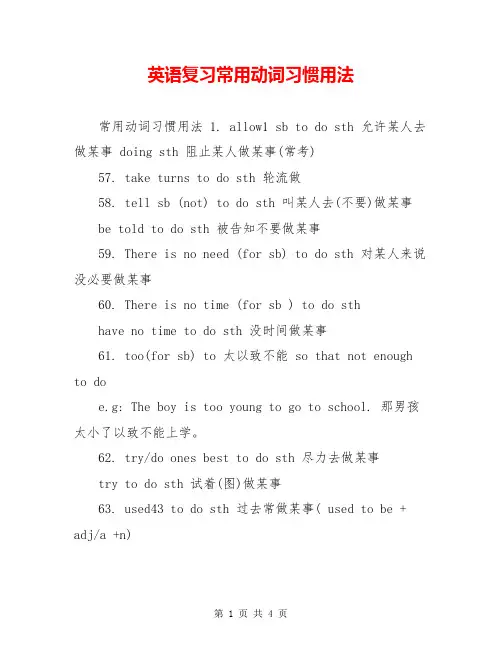
英语复习常用动词习惯用法常用动词习惯用法 1. allow1 sb to do sth 允许某人去做某事 doing sth 阻止某人做某事(常考)57. take turns to do sth 轮流做58. tell sb (not) to do sth 叫某人去(不要)做某事be told to do sth 被告知不要做某事59. There is no need (for sb) to do sth 对某人来说没必要做某事60. There is no time (for sb ) to do sthhave no time to do sth 没时间做某事61. too(for sb) to 太以致不能 so that not enough to doe.g: The boy is too young to go to school. 那男孩太小了以致不能上学。
62. try/do ones best to do sth 尽力去做某事try to do sth 试着(图)做某事63. used43 to do sth 过去常做某事( used to be + adj/a +n)e.g: Mr wang used to be a teacher worker. 王先生过去是一位工人。
I used to live in the country. 过去我住在农村。
64. want/would like to do sth 想做want/would like sb to do sth 想某人做feel like doing sth 喜爱做某事(注意like后接动词ing形式)65. warn44 sb (not) to do sth 警告某人做某事(或不要做某事)66. Why dont you do sthWhy not do sth ( 为什么不(表建议的句型,注意用动词原形) )表示建议的句型还有:What How about(如果是动词,要用ing形式)Shall we67. Would you like (sb) to do sth Yes, Id love to .68. Would you mind doing sth 你介意做某事吗Never mind/Not at all/of course45 not/certainlynot . (从不介意/一点也不介意/当然不会了)69. Would you please (not) do sth 你可不可以不做70. finish doing sth enjoy doing sth practise doing sth be good at doing sth be good at doing sth thank you for doing sth stop doing sth be good at doing sth give up doing sth mind doing sth stop sb from doing sth go on doing sth be busy doing sthsee/hear/watch sb doing sth feel like doing sth hate doing sth like doing sth do well in doing sth be afraid of doing sth be interested in doing sth make a contribution46 to sth/doing sth71. 非延续性动词(终止性动词)1.buy---have(has)had2.borrow---have(has)kept3.leave---have(has)been away4.go ---have(has)been away/ine ---have(has)here/in6.die47 ---have(has)been dead487.join---have(has)been a member of/in8.begin---have(has)on 8.stop---have(has)been overexample: 他的狗死了3天了.: His dog has been dead for three days. It is three days since49 his dogdied50. His dog died three days ago.72. 感官动词:(主动语态不带to)1.hear/see/watch sb do sth 或 2. hear/see/watch sb doing sth1. We often hear him sing the song.2. I saw51 him swimming in the river just now.被动语态带to:1. He is often heard to sing the song.役使动词: (主动语态不带to) make/let sb do sth.His father often makes him do this and that.被动语态带to:He is often made52 to do this and that by his father.。
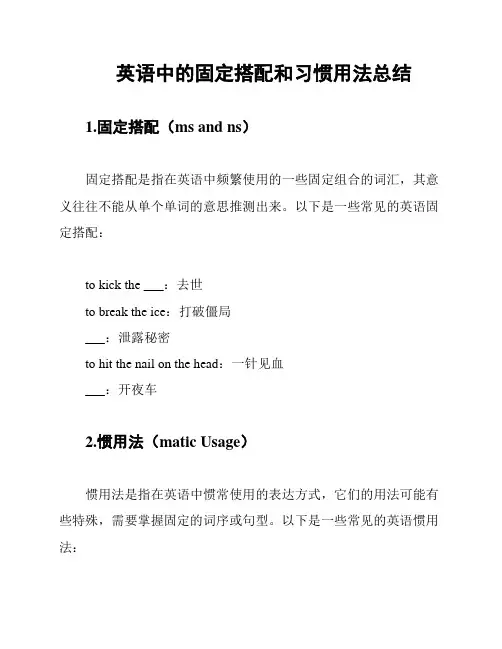
英语中的固定搭配和习惯用法总结
1.固定搭配(ms and ns)
固定搭配是指在英语中频繁使用的一些固定组合的词汇,其意义往往不能从单个单词的意思推测出来。
以下是一些常见的英语固定搭配:
to kick the ___:去世
to break the ice:打破僵局
___:泄露秘密
to hit the nail on the head:一针见血
___:开夜车
2.惯用法(matic Usage)
惯用法是指在英语中惯常使用的表达方式,它们的用法可能有些特殊,需要掌握固定的词序或句型。
以下是一些常见的英语惯用法:
to make a difference:产生影响
to take a back seat:退居次要地位
to give ___:帮助某人
to keep an eye on:密切关注
to play it by ear:随机应变
3.练建议(Practice Tips)
要提高对固定搭配和惯用法的掌握,可以采取以下方法:
阅读英语文章和书籍,特别关注其中常用的固定搭配和惯用法;
练使用固定搭配和惯用法来表达自己的想法,写作时尽量使用
这些表达方式;
参加英语口语角或者与他人进行英语对话时,积极运用这些固
定搭配和惯用法。
希望以上总结对您研究和使用英语中的固定搭配和惯用法有所
帮助!。
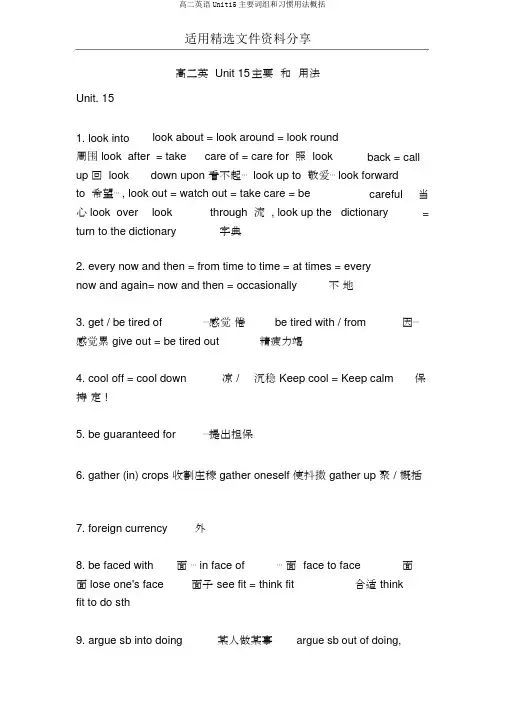
适用精选文件资料分享高二英 Unit 15主要和用法Unit. 151. look into look about = look around = look round周围 look after = take care of = care for 照 look back = call up 回 look down upon 看不起⋯ look up to 敬爱⋯ look forwardto 希望⋯ , look out = watch out = take care = be careful当心 look over look through 流 , look up the dictionary= turn to the dictionary字典2. every now and then = from time to time = at times = everynow and again= now and then = occasionally不地3. get / be tired of⋯感觉倦be tired with / from因⋯感觉累 give out = be tired out精疲力竭4. cool off = cool down凉/沉稳Keep cool = Keep calm保持定 !5. be guaranteed for⋯提出担保6. gather (in) crops 收割庄稼 gather oneself 使抖擞 gather up 聚/ 概括7. foreign currency外8. be faced with面⋯ in face of⋯面face to face面面 lose one's face面子see fit = think fit合适thinkfit to do sth9. argue sb into doing某人做某事argue sb out of doing,argue with sb about sth 与某人争某事 apologize to sb for doing = make an apology to sb for sth10. have an itch for sth = have an itch to do sth希望做某事have itching ears听奇怪的事11. be considered as / to be被⋯ consider doing sth考做某事 all things considered全部12. urge sb to do sth = urge sb into doing sth督促某人做某事13. catch / get / have a glimpse of = glimpse at瞥14. be known for 因⋯而闻名 be known to ⋯所熟知 be known as 作⋯而闻名15. celebrate sb sth祝⋯in celebration of祝⋯congratulate sb on sth祝某人某事16. There is no doubt that ⋯毫无疑⋯ There is no possibility that ⋯不能够能⋯ There is chance that ⋯有可能⋯ There is nopoint in doing sth做某事没心There is no need to do sth没有必需做某事 be in need of 需要量 need to do sth 需要做⋯ It is no good doing sth = It is no use to do sth = It is no use doing sth 做某事没用17. breath-taking惊的peace-loving people好和平人士meat-eating animals食肉物18. a feast for the eyes大开眼界/眼睛的盛宴/心悦目give / hold a feast行宴会a wedding feast婚宴19. take / have a dip in在⋯里游泳/沐浴go for a dip去游泳 take a bath 淋浴 take a vacation 休假 take a journey / trip 去旅行take a walk 去漫步20. offer to do主提做某事offer sth to sb = offer sb sth供给某人某物 offer oneself to献身于, offer sth for money开价⋯21. Things work out quite well.果I work out regularly tokeep fit.I've worked out the difficult maths question.算出 work out a plan出22. Should you have enough energy left,⋯= If you should have enough energy left,⋯.假如..23. draw up a list制表make a list of列表put one's name on the list把某人列入名中24.travel budget 旅行算 balance the budget 均衡算 travel document 旅行件25.fall in with one's view按某人意愿行事in my view = in myopinion in view 划好了 in view of 关于 with a view to doing ⋯了做⋯26. arrange for 安排 / 准 / 约定 make arrangements for ⋯作出安排27. make photocopies of复印⋯if possible若可能的aseasoned sailor = an experienced sailor28. act as 充当 /起⋯作用act for代理act out表演act up 乱/出弊端act on / upon⋯起作用29. especially特别/特是Both the brothers are tall, John especially. Specially特地/的This car was specially designed for use in the desert.30. make forecast = make weather predictions天气foretell/ forecast / predict the path of a hurricane路径all directions = in every direction in a certain direction某个方向来 give directions予指示scientific equipments 科学器 /musical instruments器in 从31. prepare for⋯= make preparations for⋯做准prepare⋯准⋯ be well prepared for = be ready for做好了做某事的准。
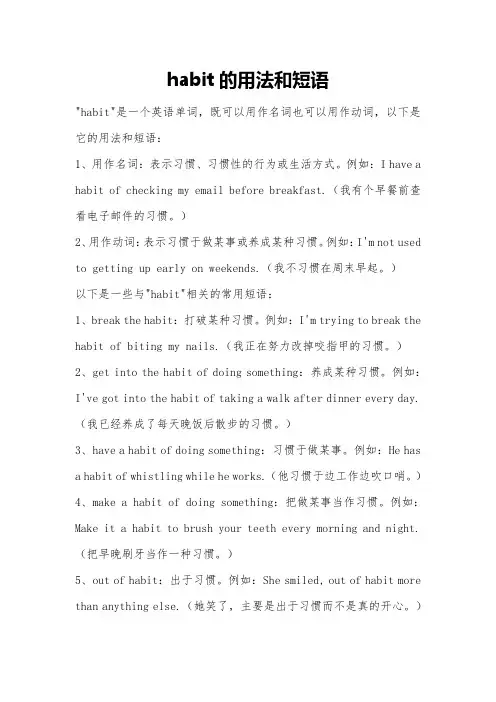
habit的用法和短语"habit"是一个英语单词,既可以用作名词也可以用作动词,以下是它的用法和短语:1、用作名词:表示习惯、习惯性的行为或生活方式。
例如:I have a habit of checking my email before breakfast.(我有个早餐前查看电子邮件的习惯。
)2、用作动词:表示习惯于做某事或养成某种习惯。
例如:I'm not used to getting up early on weekends.(我不习惯在周末早起。
)以下是一些与"habit"相关的常用短语:1、break the habit:打破某种习惯。
例如:I'm trying to break the habit of biting my nails.(我正在努力改掉咬指甲的习惯。
)2、get into the habit of doing something:养成某种习惯。
例如:I've got into the habit of taking a walk after dinner every day.(我已经养成了每天晚饭后散步的习惯。
)3、have a habit of doing something:习惯于做某事。
例如:He hasa habit of whistling while he works.(他习惯于边工作边吹口哨。
)4、make a habit of doing something:把做某事当作习惯。
例如:Make it a habit to brush your teeth every morning and night.(把早晚刷牙当作一种习惯。
)5、out of habit:出于习惯。
例如:She smiled, out of habit more than anything else.(她笑了,主要是出于习惯而不是真的开心。
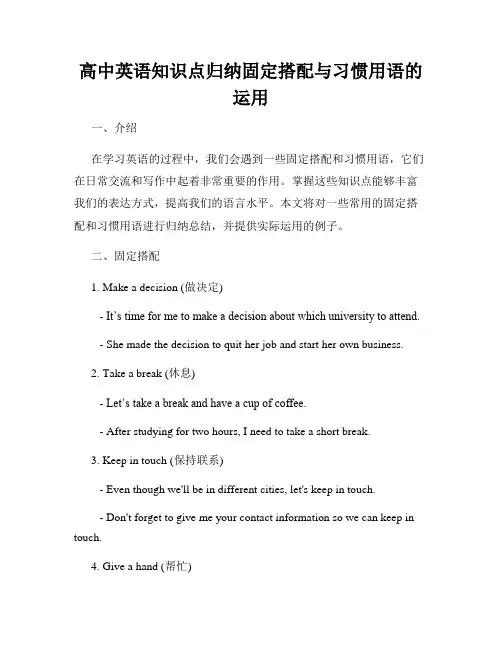
高中英语知识点归纳固定搭配与习惯用语的运用一、介绍在学习英语的过程中,我们会遇到一些固定搭配和习惯用语,它们在日常交流和写作中起着非常重要的作用。
掌握这些知识点能够丰富我们的表达方式,提高我们的语言水平。
本文将对一些常用的固定搭配和习惯用语进行归纳总结,并提供实际运用的例子。
二、固定搭配1. Make a decision (做决定)- It’s time for me to make a decision about which university to attend.- She made the decision to quit her job and start her own business.2. Take a break (休息)- Let’s take a break and have a cup of coffee.- After studying for two hours, I need to take a short break.3. Keep in touch (保持联系)- Even though we'll be in different cities, let's keep in touch.- Don't forget to give me your contact information so we can keep in touch.4. Give a hand (帮忙)- Can you give me a hand with carrying these boxes?- I need someone to give me a hand with repairing my car.5. Catch someone's attention (吸引某人的注意)- The bright colors of the advertisement caught my attention.- The speaker used humor to catch the audience's attention.三、习惯用语1. A piece of cake (易如反掌)- Don't worry, the exam will be a piece of cake for you.- After years of practice, making a perfect pancake is a piece of cake for her.2. Break the ice (打破沉默)- He told a funny joke to break the ice at the party.- Asking people about their hobbies can help break the ice in a conversation.3. Ke ep one’s fingers crossed (祝好运)- I have a job interview tomorrow, so keep your fingers crossed for me.- The entire team kept their fingers crossed during the final game of the championship.4. Hit the nail on the head (一针见血)- The professor hit the nail on the head with his analysis of the situation.- Her comment about the issue hit the nail on the head and sparked a discussion.5. A blessing in disguise (因祸得福)- Losing my job turned out to be a blessing in disguise, as it pushed me to start my own business.- His failure in the tournament was a blessing in disguise because it motivated him to train harder.四、知识点归纳本文主要介绍了一些常用的固定搭配和习惯用语,并附上了实际运用的例句。
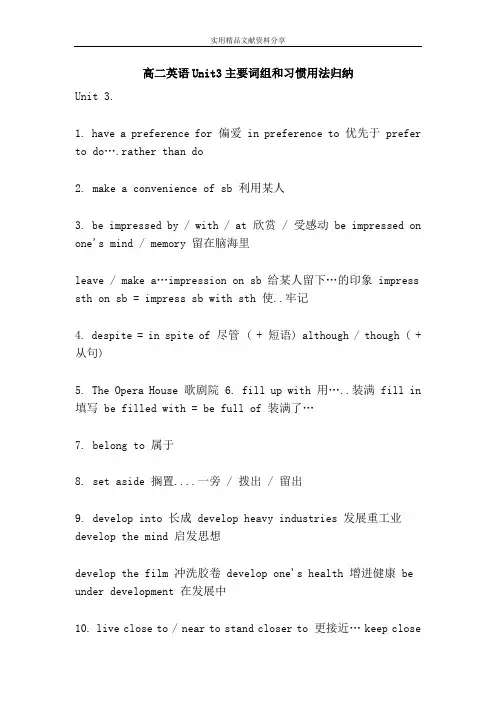
高二英语Unit3主要词组和习惯用法归纳Unit 3.1. have a preference for 偏爱 in preference to 优先于 prefer to do….rather than do2. make a convenience of sb 利用某人3. be impressed by / with / at 欣赏 / 受感动 be impressed on one's mind / memory 留在脑海里leave / make a…impression on sb 给某人留下…的印象 impress sth on sb = impress sb with sth 使..牢记4. despite = in spite of 尽管 ( + 短语) although / though ( +从句)5. The Opera House 歌剧院6. fill up with 用…..装满 fill in 填写 be filled with = be full of 装满了…7. belong to 属于8. set aside 搁置....一旁 / 拨出 / 留出9. develop into 长成 develop heavy industries 发展重工业develop the mind 启发思想develop the film 冲洗胶卷 develop one's health 增进健康 be under development 在发展中10. live close to / near to stand closer to 更接近… keep closeto me 紧跟我 come to a close 结束He came close to losing temper 差一点儿发脾气11. in the twenties 在二十年代 in one's twenties 在二十几岁时12. in a way to look unnatural / of looking unnatural13. go against 违背 / 反对 What you did went against your parents' wishes. His thinking goes against all logic.14. in the choice of 从…..的选择上 make a choice have no choice / alternative but to do别无选择只好..15. works of art 艺术品16. after a while 一会儿之后 all the while 始终 once in a while 偶尔17. Though / Although he is young, he knew a lot about the world. 尽管Despite / In spite of his young age, he knew a lot about the world.Young as / though he is, he knew a lot about the world.18. think of = think about 想起19. It looks like rain = It looks as if it is going to rain.20. A is to B what / as C is to D. 正如 A对于B来说, 正如C 对于D来说一样。
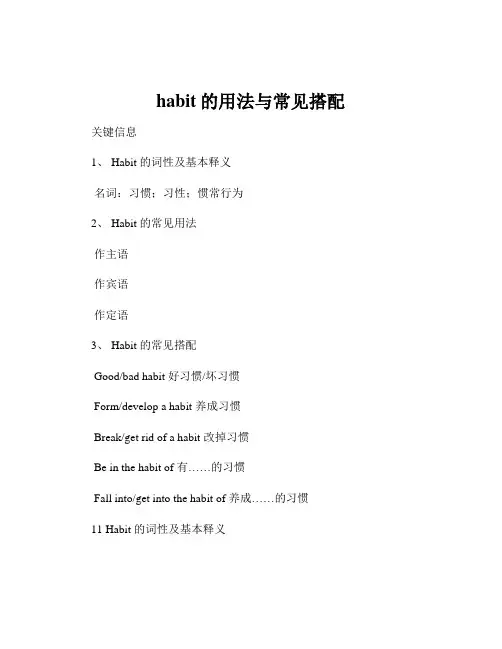
habit的用法与常见搭配关键信息1、 Habit 的词性及基本释义名词:习惯;习性;惯常行为2、 Habit 的常见用法作主语作宾语作定语3、 Habit 的常见搭配Good/bad habit 好习惯/坏习惯Form/develop a habit 养成习惯Break/get rid of a habit 改掉习惯Be in the habit of 有……的习惯Fall into/get into the habit of 养成……的习惯11 Habit 的词性及基本释义Habit 是一个名词,其主要含义为“习惯;习性;惯常行为”。
例如:“Smoking is a bad habit”(吸烟是个坏习惯。
)“The animal has a habitof hiding food”(这种动物有藏食物的习性。
)111 Habit 作为“习惯”时的强调点当 habit 指“习惯”时,强调的是个人或群体经常、反复出现的行为模式,这种行为模式通常是在一段时间内逐渐形成并且相对稳定。
112 Habit 作为“习性”时的用法表示“习性”时,habit 常用来描述生物(包括人类)在自然环境中形成的、具有一定稳定性和遗传性的行为特征。
12 Habit 的常见用法121 作主语Habit 在句子中可以充当主语,例如:“Habit determines one's success to a large extent”(习惯在很大程度上决定一个人的成功。
)122 作宾语“Habit”也能作为宾语,比如:“You should change your bad habit”(你应该改掉你的坏习惯。
)123 作定语此外,habit 还可以作定语,修饰其他名词,像“habit formation”(习惯的形成)。
13 Habit 的常见搭配131 Good/bad habit 好习惯/坏习惯“Good habit”表示良好的习惯,如“Keeping a regular schedule is a good habit”(保持规律的作息是个好习惯。
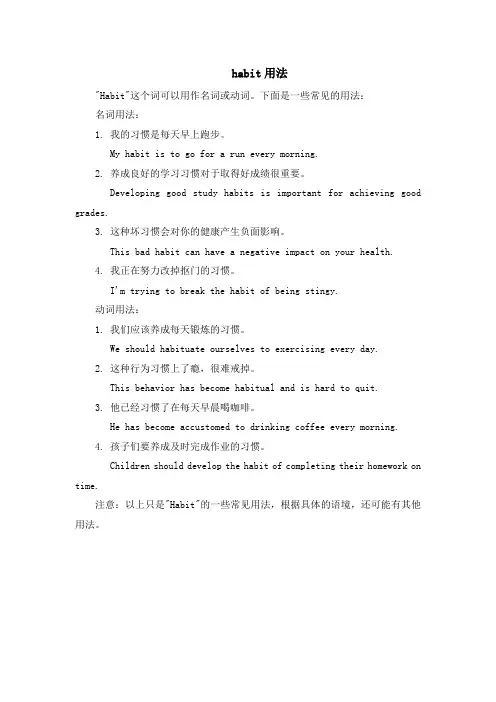
habit用法"Habit"这个词可以用作名词或动词。
下面是一些常见的用法:名词用法:1. 我的习惯是每天早上跑步。
My habit is to go for a run every morning.2. 养成良好的学习习惯对于取得好成绩很重要。
Developing good study habits is important for achieving good grades.3. 这种坏习惯会对你的健康产生负面影响。
This bad habit can have a negative impact on your health.4. 我正在努力改掉抠门的习惯。
I'm trying to break the habit of being stingy.动词用法:1. 我们应该养成每天锻炼的习惯。
We should habituate ourselves to exercising every day.2. 这种行为习惯上了瘾,很难戒掉。
This behavior has become habitual and is hard to quit.3. 他已经习惯了在每天早晨喝咖啡。
He has become accustomed to drinking coffee every morning.4. 孩子们要养成及时完成作业的习惯。
Children should develop the habit of completing their homework on time.注意:以上只是"Habit"的一些常见用法,根据具体的语境,还可能有其他用法。
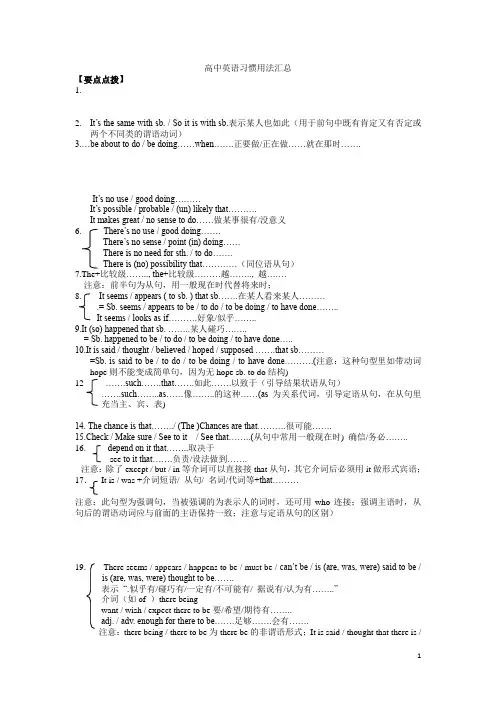
高中英语习惯用法汇总【要点点拨】1.2.It’s the same with sb. / So it is with sb.表示某人也如此(用于前句中既有肯定又有否定或两个不同类的谓语动词)3.…be about to do / be doing……when…….正要做/正在做……就在那时…….It’s no use / good doing………It’s possible / probable / (un) likely that……….It makes great / no sense to do……做某事很有/没意义6. There’s no use / good doing…….There’s no sense / point (in) doing……There is no need for sth. / to do…….There is (no) possibility that…………(同位语从句)7.The+比较级…….., the+比较级………越…….., 越…….注意:前半句为从句,用一般现在时代替将来时;8. It seems / appears ( to sb. ) that sb…….在某人看来某人……….= Sb. seems / appears to be / to do / to be doing / to have done……..It seems / looks as if……….好象/似乎……..9.It (so) happened that sb. ……..某人碰巧……..= Sb. happened to be / to do / to be doing / to have done…..10.It is said / thought / believed / hoped / supposed …….that sb………=Sb. is said to be / to do / to be doing / to have done……….(注意:这种句型里如带动词hope则不能变成简单句,因为无hope sb. to do结构)12 …….such…….that…….如此…….以致于(引导结果状语从句)…….such……..as……像……..的这种……(as为关系代词,引导定语从句,在从句里充当主、宾、表)14. The chance is that……../ (The )Chances are that……….很可能…….15.Check / Make sure / See to it / See that……..(从句中常用一般现在时) 确信/务必……..16. depend on it that……..取决于see to it that…….负责/设法做到…….注意:除了except / but / in等介词可以直接接that从句,其它介词后必须用it做形式宾语;17.It is / was +介词短语/ 从句/ 名词/代词等+that………注意:此句型为强调句,当被强调的为表示人的词时,还可用who连接;强调主语时,从句后的谓语动词应与前面的主语保持一致;注意与定语从句的区别)19. There seems / appears / happens to be / must be / can’t be / is (are, was, were) said to be /is (are, was, were) thought to be…….表示“.似乎有/碰巧有/一定有/不可能有/ 据说有/认为有……..”介词(如of )there beingwant / wish / expect there to be要/希望/期待有……..adj. / adv. enough for there to be…….足够…….会有…….注意:there being / there to be为there be的非谓语形式;It is said / thought that there is /are……=There is / was / are / were said (thought) to be……. 如:I have never dream of there being such a good chance for me.It won’t be cold enough for there to be a frost tonight.21. But for + n. / pron., sb. / sth. would (not) have done…..要不是……., 某人早就……(表示虚拟语气)=If it had not been for…..,……./ If there had not been ……., ……..22. It won(’t) be long be fore +从句(从句中用一般现在时)不久/很久就要…….It was (not) long before+从句(从句中用一般过去时)不久/很久才……..23. Those who………….(从句及主句中谓语动词用复数形式).Anyone who…………= Whoever………..(从句及主句中谓语动词用单数形式) 24…….主句(一般现在时或过去时)…...when从句….(might / should do 或might / should have done) 表示”对比”,意思为“本该……(可)而却”,主句中为陈述语气,从句里为虚拟语气,如: He stopped trying when he might have succeeded .本该已成功了他却停止努力了.25. There is ./ Sb. have no doubt that………(同位语从句,that不可省略)There is / Sb. have some doubt whether……..(同位语从句不可用if)Sb. doubt if / whether…….Sb. don’t doubt that………26 . immediately / directly / instantly / the moment +从句on / upon + n. / doingNo sooner had sb. done than …….(过去时)Hardly had sb. done when……..(过去时)注意:这几个结构都表示“一…….就”;句)anywhere / everywhere +从句(相当于wherever引导的地点状语从句)You can go anywhere you like.28.If only / I wish +从句(用过去类时态) 表示虚拟语气, “要是…….就好了” “但愿……就好了!”29 .Considering + n. 或pron. 或that从句/ Seeing that……….考虑到/鉴于…….Given + n. / pron作状语,表示“在有……的情况下” “如果有” “假定”,有时也表示”考虑到”Seeing (that) he refused to help us, there is no reason why we should help him now.Given good health, I hope to finish the work this year.Given their inexperience / that they are inexperienced, they’ve done a good job.31.other than与no, not, none等否定词连用,表示肯定意思,如:It was none other than Mr. Smith.这正是Smith先生.32. Not until…….did / do/ does / will sb. do……It was / is not until ……that sb………33.It’s (un) like sb. to do / to have done……做某事很像某人/ 做某事可不像某人34.It remains to be seen Wh--words ……..是否…….还有待于看.(不用that, if作连接词)35.It only remains for sb. to do……剩下的只是要某人做某事.We’ve got everything ready. It only remains for you to come t o dinner.36.One moment……., and now………刚才一会儿还在做……而现在却……..37.Not all / both / everyone………表示部分否定38. Such is / are……..这(些)就是…….(谓语动词单复数由后面名词决定)39. I’d rather (not) do / have done……我宁愿…..I’d rather +从句(从句中用过去时或过去完成时)40. It’s important / necessary /strange / surprising….+that……(用陈述语气或should do)41. I like / hate / appreciate it that / when等从句(it表示后面从句的这种情况)I appreciate it if you will give me a hand.43………., as is often the case with sb. / as is usual with sb.(as引导非限制性定语从句)44 in case / lest / for fear that…….(从句中用陈述语气或should do)45.While置于句首可表示As long as 或AlthoughWhile there is life there is hope.While I admit his good points, I can see his bad ones.46. can not ( never) ……too +adj. (adv. ) / adj. (adv.) + enough “越……越好”“非常”too + adj. ( anxious / eager / willing / ready / glad等)+to do….表示肯定意思I can’t thank you enough.我非常感激你.He was too glad to see his father.=He was very glad to see his father.47. not / neve等表示否定的词与比较级连用表示最高级,如:49. more……..than与其…….不如……..He is more nervous than frightened.50. It is / has been +一段时间+since从句(从句中如为延续性动词,则实际表示的意思相反)It is two years since he drank.他不喝酒已两年了.【各个击破】1.Mr. Smith didn’t understand ______ made his son so upset this morning.A. what was itB. why it was thisC. how that wasD. what it was that2.----Yes, never sleep _______.A. badlyB. betterC. worseD. best3.We are only _____ glad to do anything we can _______ her.A.too; to helpB. very; help C too; help D. very; helping4.-------_____________.A. Because I missed the busB. By bus and then on footC. Please excuse meD. It’s quite wrong5._______more than 3,000 languages in the world.A. There are thought to beB. There is thought to beC. They are thought to beD. It is thought to be6.-----George is a wise person.-----But in my opinion, he is ______ than wise.A. clevererB. braverC. more braveD. less brave7.-----No problem. I like ________ when people are open and direct.A. thatB. thisC. itD. them8.----I suppose it’ll look better.A. How ifB. What aboutC. How aboutD. What if9.China has produced ______ this year as it did in 2002.A. as twice much steelB. twice steel as muchC. twice as much steelD. as much steel twice------Totally by chance.A. How; whenB. What; thatC. What; whenD. How; that------It was _______ other than Clint Eastwood.A. noneB. nothingC. notD. nobody12._____his age, he did it quite well, so don’t ______ him any more.A Given; blame B. Considered; say C. To regard; scold D. Considering; speak13.No sooner _____ themselves in their seats in the theatre ______ the curtain went up.A. they have settled; beforeB. had they settled; thanC. have they settled; whenD. they had settled; than------______I had come here earlier!A. If onlyB. If notC. But forD. For fear15.The students expected __________ more reviewing classes before the final exams.A. it would beB. there beingC. it to beD. there to be16.Students shouldn’t be given so difficult a problem _____ they can not work out.A. thatB. whichC. whileD. as17. It was twelve o’clock at midnight _______ they arrived at a lonely village.A. thatB. beforeC. sinceD. when------No, but I don’t think ______could pass it.A. somebodyB. anybodyC. everybodyD. nobody19.-----I always take care when doing papers on the computer.-----You meant it! One can not be _______careful working on it.A. tooB. veryC. soD. quite------No. It is two months since she worked here.A. where is she working nowB. would you please show me the wayC. which is her officeD. is she ill。
高中英语知识点归纳固定搭配与习惯用语英语作为一门重要的学科,在高中阶段扮演着举足轻重的角色。
为了帮助高中生更好地掌握英语,归纳固定搭配和常用习惯用语是非常必要的。
本文将就此展开讨论,并提供一些常见的固定搭配和习惯用语供参考。
一、固定搭配1. take part in 参加E.g. Many students take part in extracurricular activities after school.2. make progress 取得进展E.g. With regular practice, he makes great progress in playing the piano.3. play a role 扮演角色E.g. The teacher plays a crucial role in students' academic development.4. set a good example 树立好榜样E.g. As a class monitor, she always sets a good example for her classmates.5. have an impact on 对...产生影响E.g. The Internet has a profound impact on people's daily lives.6. make a difference 有所作为E.g. Small acts of kindness can make a big difference in someone's life.7. pay attention to 注意,留意E.g. It is important to pay attention to details when solving math problems.8. in contrast 相比之下E.g. In contrast to her quiet personality, her brother is very outgoing.9. take advantage of 利用E.g. Students should take advantage of the library resources for their research.10. at first glance 乍一看E.g. At first glance, the question seemed difficult, but with careful thinking, it became clear.二、习惯用语1. as a matter of fact 事实上E.g. As a matter of fact, the project has already been completed.2. in the long run 从长远来看E.g. Regular exercise is beneficial for your health in the long run.3. go the extra mile 做更多努力E.g. If you want to succeed, you need to go the extra mile and put in extra effort.4. have mixed feelings 对某事持有复杂的情感E.g. I have mixed feelings about leaving my hometown and starting a new life.5. in the meantime 与此同时E.g. The repair work will take a few days. In the meantime, we need to find a temporary solution.6. on the other hand 另一方面E.g. He is an excellent student. On the other hand, he lacks social skills.7. by all means 务必E.g. If you have any questions, by all means, ask the teacher for clarification.8. take it for granted 认为...理所当然E.g. We often take our parents' love for granted, but we should express our gratitude to them.9. at the end of the day 最终,总而言之E.g. It was a challenging journey, but at the end of the day, we reached our destination.10. make ends meet 维持生计E.g. With the rising cost of living, it's becoming harder for some families to make ends meet.通过学习和掌握这些固定搭配和习惯用语,我们能够更加准确地运用英语,使我们的表达更加地流畅和地道。
由顾燕卿上传。
高中英语习惯用法汇总(经典)。
【要点点拨】1.It’s the first time that……….(从句中用现在完成时)It was for the first time that………(强调句,对状语for the first time进行强调)It’s (high) time that……..(从句中用过去时或should do)2.It’s the same with s b. / So it is with sb.表示某人也如此(用于前句中既有肯定又有否定或两个不同类的谓语动词)3.…be about to do / be doing……when…….正要做/正在做……就在那时…….4 A is twice / three times as +原级+as BA is twice / three times the n. of B.A is twice / three times +比较级+than B5. It’s a waste of time / money doing / to do…It’s no use / good doing………It’s possible / probable / (un) likely that……….It makes great / no sense to do……做某事很有/没意义6. There’s no use / good doing…….There’s no sense / point (in) doing……There is no need for sth. / to do…….There is (no) possibility that…………(同位语从句)7.The+比较级…….., the+比较级………越…….., 越…….注意:前半句为从句,用一般现在时代替将来时;8. It seems / appears ( to sb. ) that sb…….在某人看来某人……….= Sb. seems / appears to be / to do / to be doing / to have done……..It seems / looks as if……….好象/似乎……..9.It (so) happened that sb. ……..某人碰巧……..= Sb. happened to be / to do / to be doing / to have done…..10.It is said / thought / believed / hoped / supposed …….that sb………=Sb. is said to be / to do / to be doing / to have done……….(注意:这种句型里如带动词hope则不能变成简单句,因为无hope sb. to do结构)12 …….such…….that…….如此…….以致于(引导结果状语从句)…….such……..as……像……..的这种……(as为关系代词,引导定语从句,在从句里充当主、宾、表)13. Do you mind if I do sth.? / Would you mind if I did sth.?14. The chance is that……../ (The )Chances are that……….很可能…….15.Check / Make sure / See to it / See that……..(从句中常用一般现在时) 确信/务必……..16. depend on it that……..取决于see to it that…….负责/设法做到…….注意:除了except / but / in等介词可以直接接that从句,其它介词后必须用it做形式宾语;17.It is / was +介词短语/ 从句/ 名词/代词等+that………How / When / Where / Why is / was it that………..?注意:此句型为强调句,当被强调的为表示人的词时,还可用who连接;强调主语时,从句后的谓语动词应与前面的主语保持一致;注意与定语从句的区别)18 .How is it that……..(这几个句型都表示“怎么会…….?” “怎么发生的?”)How come+从句?How does / did sth. come about? ( How did it come about that…….?)如:How come you are late again?19. There seems / appears / happens to be / must be / can’t be / is (are, was, were) said to be /is (are, was, were) thought to be…….表示“.似乎有/碰巧有/一定有/不可能有/ 据说有/认为有……..”介词(如of )there beingwant / wish / expect there to be要/希望/期待有……..adj. / adv. enough for there to be…….足够…….会有…….注意:there being / there to be为there be的非谓语形式;It is said / thought that there is / are……=There is / was / are / were said (thought) to be……. 如:I have never dream of there being such a good chance for me.It won’t be cold enough for there to be a frost tonight.20. 疑问词+插入语+陈述语序?Who do you think he’ll have attend the meeting?21. But for + n. / pron., sb. / sth. would (not) have done…..要不是……., 某人早就……(表示虚拟语气)=If it had not been for…..,……./ If there had not been ……., ……..22. It won(’t) be long be fore +从句(从句中用一般现在时)不久/很久就要…….It was (not) long before+从句(从句中用一般过去时)不久/很久才……..23. Those who………….(从句及主句中谓语动词用复数形式).Anyone who…………= Whoever………..(从句及主句中谓语动词用单数形式) 24…….主句(一般现在时或过去时)…...when从句….(might / should do 或might / should have done) 表示”对比”,意思为“本该……(可)而却”,主句中为陈述语气,从句里为虚拟语气,如: Why are you here when you should be in school?你本该上学的怎么在这儿?He stopped trying when he might have succeeded .本该已成功了他却停止努力了.25. There is ./ Sb. have no doubt that………(同位语从句,that不可省略)There is / Sb. have some doubt whether……..(同位语从句不可用if)Sb. doubt if / whether…….Sb. don’t doubt that………26 . immediately / directly / instantly / the moment +从句on / upon + n. / doingNo sooner had sb. done than …….(过去时)Har dly had sb. done when……..(过去时)注意:这几个结构都表示“一…….就”;27. every time / each time / the last time / the first time / next time +从句(名词性短语引导一个时间状语句)anywhere / everywhere +从句(相当于wherever引导的地点状语从句)You can go anywhere you like.Next time you come, please bring your son along.28.If only / I wish +从句(用过去类时态) 表示虚拟语气, “要是…….就好了” “但愿……就好了!”29 .Considering + n. 或pron. 或that从句/ Seeing that……….考虑到/鉴于…….Given + n. / pron作状语,表示“在有……的情况下” “如果有” “假定”,有时也表示”考虑到”Seeing (that) he refused to help us, there is no reason why we should help him now.Given good health, I hope to finish the work this year.Given their inexperience / that they are inexperienced, they’ve done a good job.30.There was a time when…….曾经有那么一度……….31.other than与no, not, none等否定词连用,表示肯定意思,如:It was none other than Mr. Smith.这正是Smith先生.32. Not until…….did / do/ does / will sb. do……It was / is not until ……that sb………33.It’s (un) like sb. to do / to have done……做某事很像某人/ 做某事可不像某人34.It remains to be seen Wh--words ……..是否…….还有待于看.(不用that, if作连接词)35.It only remains for sb. to do……剩下的只是要某人做某事.We’ve got everything ready. It only remains for you to come to dinner.36.One moment……., and now………刚才一会儿还在做……而现在却……..37.Not all / both / everyone………表示部分否定38. Such is / are……..这(些)就是…….(谓语动词单复数由后面名词决定)39. I’d rather (not) do / have done……我宁愿…..I’d rather +从句(从句中用过去时或过去完成时)40. It’s important / necessary / strange / surprising….+that……(用陈述语气或should do)41. I like / hate / appreciate it that / when等从句(it表示后面从句的这种情况)I appreciate it if you will give me a hand.42. By the time +从句(一般现在时/过去时),主句(将来完成时/过去完成时)43………., as is often the case with sb. / as is usual with sb.(as引导非限制性定语从句)44 in case / lest / for fear that…….(从句中用陈述语气或should do)45.While置于句首可表示As long as 或AlthoughWhile there is life there is hope.While I admit his good points, I can see his bad ones.46. can not ( never) ……too +adj. (adv. ) / adj. (adv.) + enough “越……越好”“非常”too + adj. ( anxious / eager / willing / ready / glad等)+to do….表示肯定意思I can’t thank you enough.我非常感激你.He was too glad to see his father.=He was very glad to see his father.47. not / neve等表示否定的词与比较级连用表示最高级,如:-----Do you agree with his suggestion? -------I can’t agree more.48. What if……..要是…….怎么办?What if he doesn’t come tomorrow?49. more……..than与其…….不如……..He is more nervous than frightened.50. It is / has been +一段时间+since从句(从句中如为延续性动词,则实际表示的意思相反)It is two years since he drank.他不喝酒已两年了.【各个击破】1.Mr. Smith didn’t understand ______ made his son so upset this morning.A. what was itB. why it was thisC. how that wasD. what it was that2.-----Did you have a good sleep last night?----Yes, never sleep _______.A. badlyB. betterC. worseD. best3.We are only _____ glad to do anything we can _______ her.A.too; to helpB. very; help C too; help D. very; helping4.-----How come you are late for class again?-------_____________.A. Because I missed the busB. By bus and then on footC. Please excuse meD. It’s quite wrong5._______more than 3,000 languages in the world.A. There are thought to beB. There is thought to beC. They are thought to beD. It is thought to be6.-----George is a wise person.-----But in my opinion, he is ______ than wise.A. clevererB. braverC. more braveD. less brave7.-----So can I ask you a few fairly straightforward questions about yourself?-----No problem. I like ________ when people are open and direct.A. thatB. thisC. itD. them8.----______I move the picture over here?----I suppose it’ll look better.A. How ifB. What aboutC. How aboutD. What if9.China has produced ______ this year as it did in 2002.A. as twice much steelB. twice steel as muchC. twice as much steelD. as much steel twice10.-----_______was it ______ you discovered the secret of his?------Totally by chance.A. How; whenB. What; thatC. What; whenD. How; that11.-----Who on earth could it be?------It was _______ other than Clint Eastwood.A. noneB. nothingC. notD. nobody12._____his age, he did it quite well, so don’t ______ him any more.A Given; blame B. Considered; say C. To regard; scold D. Considering; speak13.No sooner _____ themselves in their seats in the theatre ______ the curtain went up.A. they have settled; beforeB. had they settled; thanC. have they settled; whenD. they had settled; than14. -----Did you meet with the famous space hero, Yang Liwei?------______I had come here earlier!A. If onlyB. If notC. But forD. For fear15.The students expected __________ more reviewing classes before the final exams.A. it would beB. there beingC. it to beD. there to be16.Students shouldn’t be given so difficult a problem _____ they can not work out.A. thatB. whichC. whileD. as17. It was twelve o’clock at midnight _______ they arrived at a lonely village.A. thatB. beforeC. sinceD. when18.-----The exam wasn’t difficult, was it?------No, but I don’t think ______could pass it.A. somebodyB. anybodyC. everybodyD. nobody19.-----I always take care when doing papers on the computer.-----You meant it! One can not be _______careful working on it.A. tooB. veryC. soD. quite20.-----Is Miss White working these days?------No. It is two months since she worked here.------Oh,_____________?A. where is she working nowB. would you please show me the wayC. which is her officeD. is she ill。
1. break-phrasesbreak away from 脱离,摆脱,破除(陈规俗套等) break down (计划、谈判等)失败;(车,机器)坏了,抛锚,出故障;(身体)垮了;分解(发生物理或化学变化)break in 强行进入,打断(说话),插嘴说break into 破门而入,打进,闯进;(使)成为碎片break off 打断,折断,中断,突然停止break one’s promise 违背诺言break out (战争、火灾、疾病)爆火,突然发生;逃脱break out of…(从囚禁处)跑出,摆脱break the law 违反纪律,犯法break through 冲破,突破,冲垮;穿越break up 拆散,驱散;分解,打碎,散会,放假3. come-phrasescome about 发生,产生,实现come across 遇见,(偶然)碰到come along 一起来;过来;快点come at 向……扑来,袭击come back 回来,恢复;反驳;再度流行come back to life/oneself 复活,苏醒过来come back to one’s mind 回忆起某事come down 下来,下降,下落,塌陷,跌落come from 来自come in 进来,开始流行,到达,涨潮,获……名次come into being 形成,出现,产生,存在come into effect/force 生效come into power/office 上台,就职come into use 使用起来,开始使用come on 快来,跟上;进行,进步(成长降临;加油come on/upon = come acrosscome out 被出版,(花)开、出来;结果是;褪色,消失come over 过来,顺便来访come to 苏醒;来到,达到;结果是,共计;得出(结论),作出(决定)come to know 终于认识到come to school 上学come true 实现come up 走近;(从土中)长出,发芽;被提出5. get-phrasesget along with…进展,过日子get away (from…) 逃走,避免,摆脱,离开get back 回来,取回,收回,恢复,还原get down降下;下来;取下;吞下;使沮丧get down on one’s knees 跪下get down to (doing) sth. 开始干某事get hold of 抓住get in 收割,陷入,研究;进站;收(税、帐等) get in a word 插话get in one’s way 挡路get in touch with 与……联系get into 进入,陷于get into trouble 陷入麻烦get off 下(车、船、飞机等),脱下,离开,(飞机)起飞get on 上(车、船、飞机等),穿上get on well with…与……相处融洽,进展顺利get out 出动,离开,拔出get out of 由……出来,避免,摆脱get over 越过,爬过,克服(困难),痊愈get ready for 为……作准备get rid of 去掉,消灭,摆脱get round (消息)传开get through 通过,完成,到达,(电话)接通;花光,耗尽get to 到达get to know 认识get together 聚集,联欢get up 起床,站起来,爬上;(风、浪等)增强get used to (doing) sth. 习惯于(干)某事get warmer 变得更暖和9. put-phrasesput an end to…完成,结束put aside 放在一边,搁置一边put away 拿开,放好,把……收起来,积蓄put back 放回(原处),拨回(钟表),阻碍,推迟put down 放下,记下,镇压;使(乘客)下车put forward 提出(计划);出风头put into 送入,输入,把……译成,把……放到什么里put into practice 付诸实施,实行put off 推迟,延期,拖延put on 穿(戴)上,上演(戏剧等);增加;开(灯、气等)put on weight 发胖put one’s heart into…全神贯注于……之中put out 出版,发行,生产,伸出,扑灭put through 接通(电话),完成put together 把……放在一起,装配put up 张贴,挂起,搭起,举起;建造;住宿 put up with 容忍,忍受 put …to bed 哄……睡觉 put …to use 利用,使用 10. take-phrasestake A for B 把A 认为是Btake (an active) part in (积极)参加 take a look at … 看一看……take a message for … 给……捎口信 take a picnic 去野餐 take a picture/photo 拍照 take a seat 坐下take an exam 参加考试 take aim (at …) 瞄准(……)take away 拿走;剥夺,减去,没收;离去 take back 收回,拿回,取消(约定) take care 小心take care of 照料,照顾;承担,负责,处理 take down 拿下,取下;写下,记录;拆毁;咽下take great trouble to do sth. 不辞辛劳干某事 take hold of 抓住take in 吸收,接受,收留,领会,理解 take interest in 对……感兴趣 take it easy 别着急 take medicine 吃药 take notes 记笔记take off 脱下;带走;营救;(飞机)起飞;取消; 减价take on 雇用,招收,开始从事,呈现,具有 take on a new look 呈现一派新面貌 take one ’s place 代替某人的职务,坐某人的座位 take one ’s temperature 量体温 take one ’s turn 轮流take out 取出,把……拿出来,领……出去,除去 take over 接替,接管,继承 take photos 拍照take place 发生,举行 take pride in 以……自豪take sth. by mistake 错拿某物 take the place of 代替,代理 take the side of 支持某方 take turns 轮流take up 拿起,举起,从事(斗争等);占(时间、空间);参加(说、唱等)take …as … 把……看作…… take …for example 以……为例 take …for granted 认为……当然 11. turn-phrasesturn about/around/round 向后转 turn against 背叛,反抗turn away 闪开;转过脸去,辞退(人);不理睬 turn back 往回走,使倒转turn down 拒绝;拧小(灯火,收音机等的声音) turn from side to side 转来转去 turn green 变绿turn in 变出,上交,转身进去,引渡(罪犯) turn into 变成turn off 关闭(电器,自来水,煤气等)turn on 旋开,打开;依靠,依赖;取决于;攻击 turn out 结果是,证明是;生产,制造turn over 把……翻过来,移交,细想;转卖 turn red with anger 气得脸发红 turn round 旋转;完全改变(主张)turn to 翻到……页,转到/向,求助于……;加油干turn to a dictionary 查阅(字典) turn to sb. (for help) 向某人救助turn up 露面,出现;把……开大;卷起turn …into … 把……变成……,把……翻译成……14. off-phrases be off 离开 call off 取消 carry off come off 离开,脱离,脱落 cut off 切断 drive off 赶走fall off 从……上掉下来 fly off 飞走 get off 下车 give off 散发go off 走掉,离开hurry off 匆匆离去,赶快去 jump off 跳离keep off 挡住,不让接近,防止 kick off 踢脱knock off 击倒,把……撞落 pay off 付清;有利可图,得益 put off 推迟ring off 挂断电话,停止讲话 see sb. off 送行see off 出发,动身;爆炸;使更明显 show off 夸示,炫耀 shut off 关闭start off 出发,动身,开始take off 脱下,营救,(飞机)起飞 tear off 拉下来,撕掉throw off 打发掉,匆匆脱下,摆脱 turn off 关(水、电、汽等) 16. out-phrasesbreak out 爆发,(战争、火灾等)突然发生carry out 开展,执行,实现,实践,贯彻,实施 check out 查明,结帐come out 出来,(书等)出版,发行 cross out 划掉die out 消灭,灭亡die out 消失,灭亡,死光 find out 找出,查明give out 发出;用完;筋疲力尽go out 出去,熄灭;退潮;罢工;努力 hand out 散发;施舍help out 帮助某人解决困难 hold out 伸出 knock out 敲出 leave out 省略let out 放出,发出;泄露;放大/宽(衣服等);出租 look out 当心,留神,向外看pick out 选出,挑出,辨别/认出,弄清楚 point out 指出 put out 扑灭run out 用完,耗尽 sell out 卖完send out 发出,派遣set out 出发,着手,开始;陈列,表示,表明,陈述show out 领……出来start out 出发,动身,开始 try out 尝试,试验(机器) turn out 结果是,证明是 wear out work out 算出,解决,有效;(情况)发展 18. up-phrasesadd up 加起来,合计break up 解体,崩溃;分解,腐蚀 bring up 抚养大,吐出build up 建立起来,增强 call up 打电话,召唤,想起 clean up 收拾,整理clear up 收拾,整理;(天气)放晴 climb up 爬上去come up 走近,发芽,上升 cut up 齐根割掉,切碎do up 头发向上梳挽,收拾,整理;扣好 dress up 打扮,穿上盛装 dry up 使干涸 eat up 吃光 fill up 装满fix up 修理,安顿 get up 起床,站起来 give up 放弃go up 走过来,上升,增长,提高 grow up 成长,长大;形成,发展 hands up 举手hang up 把……挂起来hold up 举起,使停滞,阻挡 hurry up 赶快,匆忙 join up 起接起来,联合 keep up 保持,维持 look up 查阅,向上看make up 组成,构成,编出pick up 拾起,恢复,接人上车,收听(节目),(非正规)学会;买到;好转,恢复,整理put up 张贴,举起,建立 ring up 打电话 rise up 起义 round up 赶扰 save up 储存send up 发射,发送set up 建立,创立,树立,排版,自称为,资助 shut up 闭嘴 sit up 熬夜speak up 大声讲 speed up 加快速度 stand up 起立stay up 熬夜;挺住,站立take up 从事,占,拿起,举起 throw up 吐出,呕吐 tidy up 收拾干净turn up 开大,调高;出现 use up 用光wake up 醒来,弄醒,兴奋起来。
高中英语知识点归纳固定搭配与习惯用语的用法英语作为一门语言,充满了各种各样的固定搭配和习惯用语。
这些搭配和习语的正确运用可以使我们的句子更加地自然流畅,增加我们的言语表达能力。
在高中英语学习中,我们需要对这些固定搭配和习语进行系统的归纳和学习。
本文将围绕这一主题,对高中英语知识点归纳固定搭配与习惯用语的用法进行探讨。
一、固定搭配1. take...for granted:理所当然地听任于某事例如:We often take our parents' love for granted.2. make up one's mind:做出决定例如:I have made up my mind to quit my job and start my own business.3. have a good command of:具有良好掌握例如:He has a good command of English.4. pay attention to:注意例如:Please pay attention to what the teacher is saying.5. as a matter of fact:事实上例如:As a matter of fact, I have never been to Beijing.6. in the long run:从长远来看例如:In the long run, hard work pays off.7. go through:经历;查阅例如:He has gone through a lot of hardships in his life.二、习惯用语1. hold one's breath:屏住呼吸例如:The audience held their breath as the acrobat performed his dangerous stunt.2. break the ice:打破僵局例如:Playing games can help break the ice at a party.3. keep one's fingers crossed:祈祷好运例如:I'm keeping my fingers crossed that I'll pass the driving test.4. let the cat out of the bag:泄露秘密例如:She accidentally let the cat out of the bag about the surprise party.5. get the hang of:掌握要领例如:After a few attempts, she finally got the hang of riding a bike.6. on cloud nine:非常高兴例如:Winning the competition put him on cloud nine.7. a piece of cake:易事例如:The exam was a piece of cake for him, as he had studied hard.以上仅是一些高中英语的固定搭配和习惯用语的用法,希望能对你的学习有所帮助。
高中英语习惯用法汇总【要点点拨】1.It’s the first time that……….(从句中用现在完成时)It was for the first time that………(强调句,对状语for the first time进行强调)It’s (high) time that……..(从句中用过去时或should do)2.It’s the same with sb. / So it is with sb.表示某人也如此(用于前句中既有肯定又有否定或两个不同类的谓语动词)3.…be about to do / be doing……when…….正要做/正在做……就在那时…….4 A is twice / three times as +原级+as BA is twice / three times the n. of B.A is twice / three times +比较级+than B5. It’s a waste of time / money doing / to do…It’s no use / good doing………It’s possible / probable / (un) likely that……….It makes great / no sense to do……做某事很有/没意义6. There’s no use / good doing…….There’s no sense / point (in) doing……There is no need for sth. / to do…….There is (no) possibility that…………(同位语从句)7.The+比较级…….., the+比较级………越…….., 越…….注意:前半句为从句,用一般现在时代替将来时;8. It seems / appears ( to sb. ) that sb…….在某人看来某人……….= Sb. seems / appears to be / to do / to be doing / to have done……..It seems / looks as if……….好象/似乎……..9.It (so) happened that sb. ……..某人碰巧……..= Sb. happened to be / to do / to be doing / to have done…..10.It is said / thought / believed / hoped / supposed …….that sb………=Sb. is said to be / to do / to be doing / to have done……….(注意:这种句型里如带动词hope则不能变成简单句,因为无hope sb. to do结构)12 …….such…….that…….如此…….以致于(引导结果状语从句)…….such……..as……像……..的这种……(as为关系代词,引导定语从句,在从句里充当主、宾、表)13. Do you mind if I do sth.? / Would you mind if I did sth.?14. The chance is that……../ (The )Chances are that……….很可能…….15.Check / Make sure / See to it / See that……..(从句中常用一般现在时) 确信/务必……..16. depend on it that……..取决于see to it that…….负责/设法做到…….注意:除了except / but / in等介词可以直接接that从句,其它介词后必须用it做形式宾语;17.It is / was +介词短语/ 从句/ 名词/代词等+that………How / When / Where / Why is / was it that………..?注意:此句型为强调句,当被强调的为表示人的词时,还可用who连接;强调主语时,从句后的谓语动词应与前面的主语保持一致;注意与定语从句的区别)18 .How is it that……..(这几个句型都表示“怎么会…….?” “怎么发生的?”)How come+从句?How does / did sth. come about? ( How did it come about that…….?)如:How come you are late again?19. There seems / appears / happens to be / m ust be / can’t be / is (are, was, were) said to be /is (are, was, were) thought to be…….表示“.似乎有/碰巧有/一定有/不可能有/ 据说有/认为有……..”介词(如of )there beingwant / wish / expect there to be要/希望/期待有……..adj. / adv. enough for there to be…….足够…….会有…….注意:there being / there to be为there be的非谓语形式;It is said / thought that there is /are……=There is / was / are / were said (thought) to be……. 如:I have never dream of there being such a good chance for me.It won’t be cold enough for there to be a frost toni ght.20. 疑问词+插入语+陈述语序?Who do you think he’ll have attend the meeting?21. But for + n. / pron., sb. / sth. would (not) have done…..要不是……., 某人早就……(表示虚拟语气)=If it had not been for…..,……./ If there had not been ……., ……..22. It won(’t) be long be fore +从句(从句中用一般现在时)不久/很久就要…….It was (not) long before+从句(从句中用一般过去时)不久/很久才……..23. Those who………….(从句及主句中谓语动词用复数形式).Anyone who…………= Whoever………..(从句及主句中谓语动词用单数形式) 24…….主句(一般现在时或过去时)…...when从句….(might / should do 或might / should have done) 表示”对比”,意思为“本该……(可)而却”,主句中为陈述语气,从句里为虚拟语气,如: Why are you here when you should be in school?你本该上学的怎么在这儿?He stopped trying when he might have succeeded .本该已成功了他却停止努力了.25. There is ./ Sb. have no doubt that………(同位语从句,that不可省略)There is / Sb. have some doubt whether……..(同位语从句不可用if)Sb. doubt if / whether…….Sb. don’t doubt that………26 . immediately / directly / instantly / the moment +从句on / upon + n. / doingNo sooner had sb. done than …….(过去时)Hardly had sb. done when……..(过去时)注意:这几个结构都表示“一…….就”;27. every time / each time / the last time / the first time / next time +从句(名词性短语引导一个时间状语句)anywhere / everywhere +从句(相当于wherever引导的地点状语从句)Y ou can go anywhere you like.Next time you come, please bring your son along.28.If only / I wish +从句(用过去类时态) 表示虚拟语气, “要是…….就好了” “但愿……就好了!”29 .Considering + n. 或pron. 或that从句/ Seeing that……….考虑到/鉴于…….Given + n. / pron作状语,表示“在有……的情况下” “如果有” “假定”,有时也表示”考虑到”Seeing (that) he refused to help us, there is no reason why we should help him now.Given good health, I hope to finish the work this year.Given their inexperience / that they are inexperienced, they’ve done a good job.30.There was a time when…….曾经有那么一度……….31.other than与no, not, none等否定词连用,表示肯定意思,如:It was none other than Mr. Smith.这正是Smith先生.32. Not until…….did / do/ does / will sb. do……It was / is not until ……that sb………33.It’s (un) like sb. to do / to have done……做某事很像某人/ 做某事可不像某人34.It remains to be seen Wh--words ……..是否…….还有待于看.(不用that, if作连接词)35.It only remains for sb. to do……剩下的只是要某人做某事.We’ve got every thing ready. It only remains for you to come to dinner.36.One moment……., and now………刚才一会儿还在做……而现在却……..37.Not all / both / everyone………表示部分否定38. Such is / are……..这(些)就是…….(谓语动词单复数由后面名词决定)39. I’d rather (not) do / have done……我宁愿…..I’d rather +从句(从句中用过去时或过去完成时)40. It’s important / necessary / strange / surprising….+that……(用陈述语气或should do)41. I like / hate / appreciate it that / when等从句(it表示后面从句的这种情况)I appreciate it if you will give me a hand.42. By the time +从句(一般现在时/过去时),主句(将来完成时/过去完成时)43………., as is often the case with sb. / as is usual with sb.(as引导非限制性定语从句)44 in case / lest / for fear that…….(从句中用陈述语气或should do)45.While置于句首可表示As long as 或AlthoughWhile there is life there is hope.While I admit his good points, I can see his bad ones.46. can not ( never) ……too +adj. (adv. ) / adj. (adv.) + enough “越……越好”“非常”too + adj. ( anxious / eager / willing / ready / glad等)+to do….表示肯定意思I can’t thank you enough.我非常感激你.He was too glad to see his father.=He was very glad to see his father.47. not / neve等表示否定的词与比较级连用表示最高级,如:-----Do you agree with his suggestion? -------I can’t agree more.48. What if……..要是…….怎么办?What if he doesn’t come tomorrow?49. more……..than与其…….不如……..He is more nervous than frightened.50. It is / has been +一段时间+since从句(从句中如为延续性动词,则实际表示的意思相反)It is two years since he drank.他不喝酒已两年了.【各个击破】1.Mr. Smith didn’t understand ______ made his son so upset this morning.A. what was itB. why it was thisC. how that wasD. what it was that2.-----Did you have a good sleep last night?----Y es, never sleep _______.A. badlyB. betterC. worseD. best3.We are only _____ glad to do anything we can _______ her.A.too; to helpB. very; help C too; help D. very; helping4.-----How come you are late for class again?-------_____________.A. Because I missed the busB. By bus and then on footC. Please excuse meD. It’s quite wrong5._______more than 3,000 languages in the world.A. There are thought to beB. There is thought to beC. They are thought to beD. It is thought to be6.-----George is a wise person.-----But in my opinion, he is ______ than wise.A. clevererB. braverC. more braveD. less brave7.-----So can I ask you a few fairly straightforward questions about yourself?-----No problem. I like ________ when people are open and direct.A. thatB. thisC. itD. them8.----______I move the picture over here?----I suppose it’ll look better.A. How ifB. What aboutC. How aboutD. What if9.China has produced ______ this year as it did in 2002.A. as twice much steelB. twice steel as muchC. twice as much steelD. as much steel twice10.-----_______was it ______ you discovered the secret of his?------Totally by chance.A. How; whenB. What; thatC. What; whenD. How; that11.-----Who on earth could it be?------It was _______ other than Clint Eastwood.A. noneB. nothingC. notD. nobody12._____his age, he did it quite well, so don’t ______ him any more.A Given; blame B. Considered; say C. To regard; scold D. Considering; speak13.No sooner _____ themselves in their seats in the theatre ______ the curtain went up.A. they have settled; beforeB. had they settled; thanC. have they settled; whenD. they had settled; than14. -----Did you meet with the famous space hero, Y ang Liwei?------______I had come here earlier!A. If onlyB. If notC. But forD. For fear15.The students expected __________ more reviewing classes before the final exams.A. it would beB. there beingC. it to beD. there to be16.Students shouldn’t be given so difficult a problem _____ they can not work out.A. thatB. whichC. whileD. as17. It was twelve o’clock at midnight _______ they arrived at a lonely village.A. thatB. beforeC. sinceD. when18.-----The exam wasn’t difficult, was it?------No, but I don’t think ______could pass it.A. somebodyB. anybodyC. everybodyD. nobody19.-----I always take care when doing papers on the computer.-----Y ou meant it! One can not be _______careful working on it.A. tooB. veryC. soD. quite20.-----Is Miss White working these days?------No. It is two months since she worked here.------Oh,_____________?A. where is she working nowB. would you please show me the wayC. which is her officeD. is she ill。